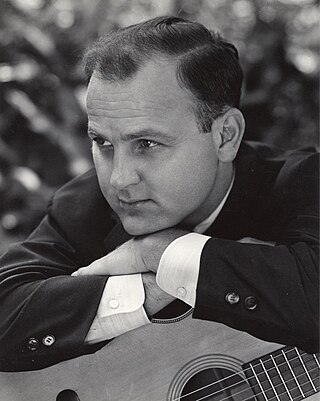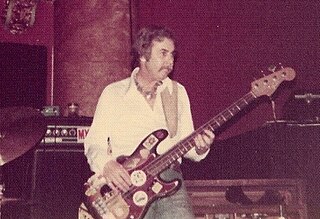
John Leslie "Wes" Montgomery was an American jazz guitarist. Montgomery was known for his unusual technique of plucking the strings with the side of his thumb and for his extensive use of octaves, which gave him a distinctive sound.
Larry Ridley is an American jazz bassist and music educator.
Herman Riley was a jazz saxophonist who was a studio musician in Los Angeles. He worked with Gene Ammons, Lorez Alexandria, Count Basie, Bobby Bryant, Donald Byrd, Benny Carter, Quincy Jones, Shelly Manne, Blue Mitchell, and Joe Williams. He died of heart failure in Los Angeles at the age of 73.

Pete Candoli was an American jazz trumpeter. He played with the big bands of Woody Herman and Stan Kenton and worked in the studios of the recording and television industries.

Howard Mancel Roberts was an American jazz guitarist, educator, and session musician.
James "Osie" Johnson was a jazz drummer, arranger and singer.

Jack Wilton Marshall was an American jazz guitarist, composer, arranger, and record producer. He was married to Eva Katherine Pellegrini, and the father to four children, three sons, producer/director Frank Marshall, Composer/Arranger Phil Marshall, (Bassist) Matt Marshall, and a daughter, Sally Marshall. Jack is also the cousin of classical guitarist Christopher Parkening.
Virtue Hampton Whitted was an American jazz singer and bassist who is best known for her performances during the 1940s and 1950s as a member of the Hampton family band and The Hampton Sisters, a musical group she formed during World War II with her siblings, Aletra, Carmalita, and Dawn Hampton.

Howard Robert Hammer was an American jazz pianist, composer and arranger.
Lawrence Benjamin Bunker was an American jazz drummer, vibraphonist, and percussionist. A member of the Bill Evans Trio in the mid-1960s, he also played timpani with the Los Angeles Philharmonic orchestra.
Alvin Stoller was an American jazz drummer. Though he seems to have been largely forgotten, he was held in high regard in the 1940s and 1950s. He was best known for playing drums on both Mitch Miller's recording of "The Yellow Rose of Texas" and Stan Freberg's parody of Miller's recording.

Max Bennett was an American jazz bassist and session musician.

Hadley Caliman was an American jazz saxophone and flute player.
Basin Street East was a notable nightclub of the 1960s in New York City. Several live albums were recorded there, including Peggy Lee's Basin Street East Proudly Presents Miss Peggy Lee (1961), and Billy Eckstine's At Basin St. East (1961).

Dawn Hampton was an American cabaret and jazz singer, saxophonist, dancer, and songwriter. Hampton began her lifelong career as a musical entertainer touring the Midwest as a three-year-old member of the Hampton family's band The Hampton Sisters in the late 1930s. During World War II and into early 1950s, she performed as part of a quartet with her three sisters and in a jazz band with all nine of her surviving siblings. Hampton moved to New York City in 1958 to pursue a solo career as a cabaret singer. She became a singer/songwriter and dancer, which included off-Broadway theatre performances and swing dancing in Hollywood films. Along with other members of the musical Hamptons, she was a recipient of the State of Indiana's Governor Arts Award (1991) and honored at the Indy Jazz Fest (2000) in Indianapolis, Indiana.
Dennis Matthew Budimir was an American jazz and rock guitarist. He was considered to be a member of The Wrecking Crew.
Charles M. Brown, better known as Charles Owens, is an American jazz saxophonist and flautist. Owens should not be confused with Charles Owens, an American jazz saxophonist born in 1972 who has recorded for Fresh Sound Records.
Aletra Hampton was an American jazz pianist and singer, best known for her performances during the 1940s and 1950s as a member of the Hampton family band and The Hampton Sisters, a quartet she formed during World War II with her siblings, Carmalita, Virtue and Dawn. The Middletown, Ohio, native began performing at a young age and moved with her family to Indianapolis, Indiana, in 1938. Hampton and her eight siblings performed in the 1940s and 1950s in Duke Hampton's band, their oldest brother's jazz orchestra. The group became well known as the house band at nightclubs in Indianapolis and Cincinnati, Ohio, and toured the United States playing at venues that included New York City's Carnegie Hall and Harlem's Apollo Theater and the Savoy Ballroom. The family's band dissolved in the 1950s, but Hampton and two of her sisters, Virtue and Carmalita, continued to perform as the Hampton Sisters for several more years. The trio reunited in Indianapolis in 1981 after almost a twenty-year hiatus. Hampton and her sister, Virtue, continued to perform as a duo, mostly in Indianapolis, until 2006.
The Hampton Sisters, an African-American quartet of jazz musicians was formed in Indianapolis, Indiana, during World War II. The group initially consisted of four siblings: Aletra Hampton, Carmalita Hampton, Virtue Hampton Whitted, and Dawn Hampton. Although the Middletown, Ohio, natives signed a recording contract in 1954, they were better known for their live performances as part of their family's jazz band during the 1940s and 1950s and as the Hampton Sisters. The Hampton family of four sisters and five brothers performed at New York City's Carnegie Hall and Harlem's Apollo Theater and the Savoy Ballroom. The group also toured the United States and performed as the house band at nightclubs in Indianapolis and Cincinnati, Ohio. Dawn Hampton left the group in 1958 to pursue a solo career as a New York City cabaret singer and, later, a swing dancer, while the other sisters formed a trio and continued to perform as the Hampton Sisters for several more years. Carmalita reunited with her sisters, Aletra and Virtue, in 1981, after a nearly twenty-year break. Following Carmalita's death in 1987, Aletra and Virtue performed as the Hampton Sisters duo, mostly in the Indianapolis area, until 2006.
Erroll Grandy was an American jazz pianist.







